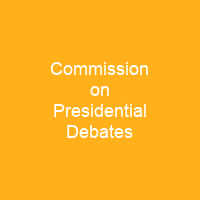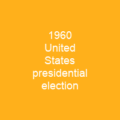The Commission on Presidential Debates (CPD) is a nonprofit corporation established in 1987 under the joint sponsorship of the Democratic and Republican political parties. Washington University in St. Louis has been selected by the Commission to host more presidential and vice-presidential debates than any institution in history. The first televised presidential debates were held between Richard Nixon and John F. Kennedy during the 1960 campaign.
About Commission on Presidential Debates in brief

In 2000, the CPD established a rule that for a candidate to be included in the national debates he or she must garner at least 15% support across five national polls. In 2004, two presidential candidates, Libertarian candidate Michael Badnarik and Green Party candidate David Cobb, were arrested while protesting against CPD for excluding third- Party candidates. In 2012, Green Party presidential nominee Jill Stein and Vice-Presidential nominee Cheri Honkala were arrested for disorderly conduct.
You want to know more about Commission on Presidential Debates?
This page is based on the article Commission on Presidential Debates published in Wikipedia (as of Jan. 04, 2021) and was automatically summarized using artificial intelligence.







